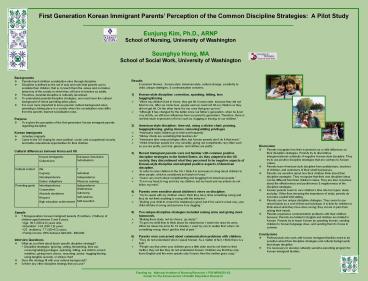Backgrounds - PowerPoint PPT Presentation
1 / 1
Title: Backgrounds
1
First Generation Korean Immigrant Parents
Perception of the Common Discipline Strategies
A Pilot Study
Eunjung Kim, Ph.D., ARNP School of Nursing,
University of Washington Seunghye Hong,
MA School of Social Work, University of Washington
- Backgrounds
- Parents teach children socialization rules
through discipline. - Discipline is defined as the set of acts and
rules that parents use to socialize their
children, that is, to teach them the values and
normative behaviors of the society in which they
will have to function as adults. - Therefore, parental discipline is culturally
developed. - To understand parental discipline strategies, one
must know the cultural background of where
parenting takes place. - It is even more important to know parents
cultural background when parenting is taking
place in a society where the socialization rules
differ from the parents learned socialization
rules. - Purpose
- To explore the perception of the first-generation
Korean immigrant parents regarding discipline. - Korean immigrants
- Voluntary migrants.
- Came to the US hoping for more political, social,
and occupational security and better educational
opportunities for their children. - Cultural differences between Korea and US
- Results6 common themes Korean-style,
American-style, cultural change, sensitivity to
child, unique strategies, communication
concerns. - Korean-style discipline correction, spanking,
hitting, less hugging/kissing - When my children lived in Korea, they got hit,
Korean style, because they did not listen to me.
After we came here, people said we could not hit
our children so they did not get hit. On the
other hand it is my voice that goes up now. - Although it has changed for the better since our
fathers generation, when he lived very strictly,
we still have influences from our parents
generation. Therefore, there is not that much
expression (of love) such as, hugging or kissing,
to our children. - American-style discipline time out, using a
sticker chart, praising, - hugging/kissing, giving chores, removing/adding
privileges - Americans make children go to time-out
frequently. - Sticker charts are something that teachers do
- Americans take away privileges often, but Korean
parents dont do it that much. - I think American people live very sensibly,
giving out compliments very often such as you are
pretty, your hair, glasses, and clothes are
pretty. - Recent immigrant parents were not familiar with
common positive discipline strategies in the
United States. As they adapted to the US society,
they discontinued what they perceived to be
negative aspects of Korean-style discipline and
adopted positive aspects of American discipline. - In order to raise children in the US, I think it
is necessary to brag about children to other
people, which is considered as foolish in Korea. - I learn very much about complimenting and
bragging from American people. - It is in my head to hug and kiss my children,
but my heart and my actions do not follow my
mind. - Parents were sensitive about childrens views on
discipline. - I try to speak with my children when I think
they have done something wrong and they do not
think anything is wrong with the behavior.
- Discussion
- Parents recognize how their experience as a child
influences on their discipline strategies.
Parents try to discontinue intergenerational
continuity of negative Korean-style discipline.
They try to use positive discipline strategies
that are contrary to Korean values. - Parents learn American-style discipline from
pediatricians, teachers of children, and
customers of their small businesses. - Parents are sensitive about how their children
think about their discipline strategies. They
recognize that their own discipline ideas can be
different from their childrens ideas. They are
also conscious about the effectiveness and
positiveness negativeness of the discipline
strategies. - Korean parents seem to view childrens time into
two types study and play. Other than stressing
the importance of study, parents do not make
explicit limit setting. - Parents use two unique discipline strategies.
They seem to use raised hands as a sort of
time-out technique. It is time for children to
think about what they have done wrong they can
be in pain from raising their hands. - Parents experience communication problems with
their children because Parents are limited in
English and children are limited in Korean.
Parents try to teach Korean by speaking Korean,
sending children to Korean language class, and
sending them to Korea in summer. - Conclusions
- Professionals who work with Korean immigrant
families need to be sensitive about their
discipline strategies and cultural backgrounds
that shape discipline. - It is necessary to develop culturally sensitive
parenting program for Korean immigrant families.
Korean immigrants Collectivism European Americans Individualism
Cultural context We In-group Interdependence Duties/ obligations I Individual Independence Pleasure seeking
Parenting goals Interdependence Cooperation Absolute obedience Respect High education achievement Independence Distinctness Autonomy Self-reliance Self-assertion
- Sample
- 7 first-generation Korean immigrant parents (5
mothers, 2 fathers) of children aged between 5
and 8 years. Age 36.3 (SD4.8) years olds. - Education 14.8 (SD1.9) years. US
residency 7.7 (SD5.2) years. Family income
86 between 40,000 - 60,000. - Interview Questions
- What do you think about each specific discipline
strategy? Discipline strategies ignoring,
yelling, threatening, time out, removing/adding
privileges, spanking, hitting, ask child to
correct mistakes, giving more chores, reasoning,
praise, hugging/kissing, using tangible
rewards, or sticker chart - Does this strategy fit with your cultural
background? - Is there any other discipline strategy that you
use?
Funding by National Institute of Nursing
Research 1 P20 NR08351-02 Center for the
Advancement of Health Disparities Research































